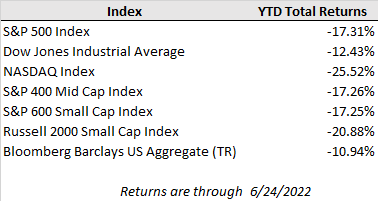A rough second quarter in the market will come to an end this week. Of a positive note is the S&P 500 rose by more than 3% on Friday and gained 6% for the week. That is the second-best week of 2022 and its first full weekly rise since late May. The economic calendar in the week ahead includes updates on durable goods orders on June 27, home prices on June 28, GDP on June 29, PMI on June 30, and construction spending on July 1. At the end of the week, traders will be watching the OPEC meeting to see if the plan is to proceed with the targeted August oil production increase against a backdrop of high prices and limited spare capacity for some members.
Fed Chairman Powell told the House Financial Services Committee members last week that “we have a labor market that is sort of unsustainably hot and we’re very far from our inflation target. We really need to restore price stability, get inflation back down to 2%, because without that we’re not going to be able to have a sustained period of maximum employment.” Inflation is high and is not slowing down yet. One lesson of the ’70s and early ’80s was that allowing high inflation to fester is worse than doing something about it, even if doing something is painful. Many of those around at the time will remember the fear that double digit inflation would give way to true hyperinflation, the kind we associate with emerging economies and politically captive central banks. The risk, of course, is that the Fed may unwittingly tighten policy too much and induce a recession. Chairman Powell touched on this risk: "we are not trying to provoke and do not think we will need to provoke a recession, but we do think it's absolutely essential" to bring down price pressures. One silver lining during this policy uncertainty was the result of the annual stress test of bank’s balance sheets, which showed all banks have an adequate capital buffer to withstand a significant market downturn.
Russia has defaulted for the first time since the Bolshevik Revolution in 1917, after a 30-day grace period for the country to disburse two Eurobond interest payments expired on Sunday night. It's a symbolic move given that the Moscow has enough money to pay off the debt but is barred from doing so because of the Western sanctions leveled on the government for starting a war in Ukraine.
Over 1,200 flights were canceled this weekend in the United States. A combination of factors has led to the travel hassles. Flight demand has bounced back faster than the airline industry anticipated, with many staff members finding permanent jobs elsewhere, and the pandemic slowed training of air traffic controllers and pilots. Normal issues like thunderstorms during the spring and summer have also continued to plague key travel routes, while COVID infections continue to sideline airline and airport employees, further frustrating holiday travelers.


